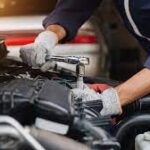5 Simple Car Maintenance Tasks You Should Perform Regularly
Keeping your car in tip-top condition is vital for more than just the sake of appearances. Regular car maintenance is crucial for your safety, prolonging your vehicle’s life and avoiding expensive repairs in the long run.
Contrary to popular belief, car maintenance doesn’t have to be a daunting or complicated task. In fact, you can perform a few simple maintenance tasks to help your car stay in excellent condition, and they will only take up a little of your time.
These tasks can be done relatively quickly and easily, from checking tire pressure to changing the oil. Read on to learn more about the basics of car maintenance and the importance of keeping your car in good condition. It can save you from costly repairs, and regular maintenance will also improve your driving experience.
A car valuation in Dubai is a quick and easy process that can give you peace of mind knowing you’re getting a fair price before selling your car.
1- Check and Change Engine Oil Regularly
One of the most important things you should do to keep your car running smoothly is to check and change the engine oil regularly. Oil is the lifeblood of your vehicle’s engine, and it plays a crucial role in lubricating various engine components, reducing friction, and ensuring that everything runs efficiently. Over time, oil can become dirty and contaminated, leading to engine damage and reduced performance.
To prevent this, we recommend checking your oil levels at least once a month and changing your oil and oil filter as advised by your vehicle’s manufacturer. Typically, this will be every 5,000 to 7,500 miles or every six months. By regularly changing your oil, you can help prevent costly engine repairs, improve fuel efficiency, and extend the life of your car.
If you want to sell any car in Dubai quickly and hassle-free, make sure it’s well-maintained.
2- Check and Replace Air Filters
One of the most crucial yet neglected car maintenance tasks is checking and replacing your air filters. Air filters play a pivotal role in keeping the engine running smoothly by preventing dirt, debris, and other contaminants from entering the engine. Over time, these contaminants clog up the air filters, reducing their effectiveness and, in turn, your engine’s performance and fuel efficiency.
To stop this from happening, we recommend you check your air filters every 12,000 miles or once a year and replace them as necessary. Checking and replacing your air filters is a simple task and can be done with basic tools. However, if you need more clarification or are uncomfortable with doing it yourself, it’s best to entrust your car to a professional who can get it done right. You can then ask them to teach you how it is done so you can take care of it on your own.
3- Check and Replace Windshield Wipers
Replacing your windshield wipers should be done as soon as you notice any issues to ensure clear visibility while driving in any weather condition. You can check the condition of your wipers by lifting the arms and checking for any cracks, tears, or other damage to the blade. If your wipers are leaving streaks or not clearing away water effectively, it is time to replace them.
Replacement wiper blades are relatively inexpensive and widely available at auto parts stores. Be sure to purchase wiper blades compatible with your vehicle’s make and model. Replacing your windshield wipers every six to twelve months is recommended to maintain maximum visibility while driving. Pay attention to this task, as replacing your wiper blades only takes a few minutes but can improve your safety by miles.
4- Regularly Inspect Brake Lines and Fluid
The braking system is one of your car’s most critical safety features. Regular inspection of the brake lines and fluid can help prevent a dangerous situation on the road. Over time, the brake lines can become corroded or wear out due to exposure to harsh weather conditions and heat. A damaged or leaking brake line can cause pressure loss, leading to brake failure. Therefore, inspecting the brake lines and fluid at least every six months is crucial.
First, check the brake lines for any signs of corrosion, cracks, or leaks. Also, check the rubber brake hoses’ condition and ensure they’re not worn out or deteriorated. Next, check the brake fluid level and look for discoloration, which may indicate contamination or moisture in the system. If any issues are found, take your car to a trusted mechanic immediately to avoid any potential brake failure. Regularly inspecting the brake lines and fluid can help keep your vehicle safe on the road and prolong the lifespan of your braking system.
5- Monitor Tire Pressure and Check Tread Depth
Monitoring tire pressure and checking the tread depth of your car’s tires are two of the most straightforward yet crucial car maintenance tasks you can perform regularly. Maintaining the proper tire pressure helps ensure optimal driving performance, fuel efficiency, and overall safety. You should check the tire pressure at least once a month and before long trips, using a tire gauge to ensure it’s within the recommended range specified in your car’s owner’s manual.
On the other hand, checking the tread depth helps ensure that your tires have ample grip on wet or slippery roads, preventing skids and accidents. You can test it by placing a penny into the tread with Lincoln’s head facing downwards. If you can see his entire head, it’s time to replace the tires.







